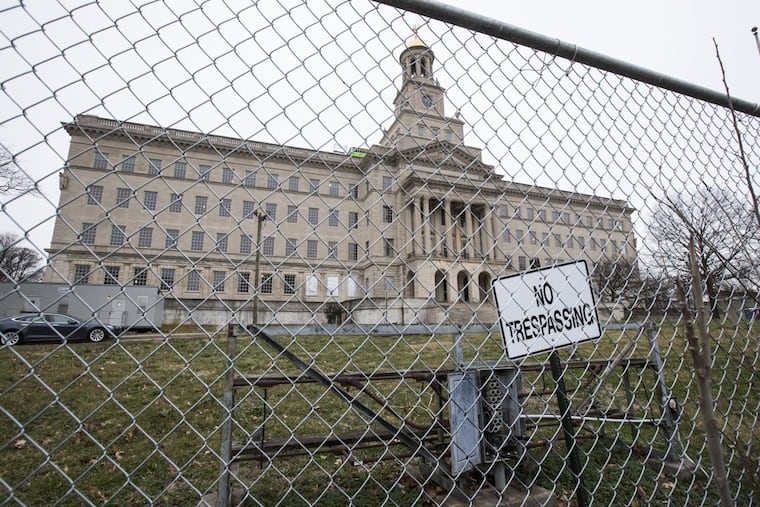City Council punts on Provident Mutual building sale, jeopardizing West Philly site’s redevelopment
The holdup jeopardizes Iron Stone’s plans for the 325,000-square-foot building at 46th and Market Streets, which were to include Children’s Hospital of Philadelphia medical offices and a YMCA day-care center.

Plans to redevelop the former Provident Mutual Life Insurance Co. building in West Philadelphia into a public health campus hit a snag Thursday after City Council decided not to vote on the property’s sale amid questions about whether the city was getting a fair price for the site and whether community members had been adequately informed about the proposal.
Councilwoman Jannie Blackwell, who introduced the bill authorizing the property’s sale to developer Iron Stone Real Estate Partners, put the legislation on hold before what had been a scheduled final vote approving the transaction.
The holdup jeopardizes Iron Stone’s plans for the 325,000-square-foot building at 4601 Market St., which were to include Children’s Hospital of Philadelphia medical offices and a YMCA day-care center.
The Philadelphia-based developer was selected through an open bidding process to acquire the 13-acre city-owned property for $10 million after plans to move Philadelphia’s police headquarters there were dropped in favor of the former Inquirer newspaper building on North Broad Street.
Blackwell said in an interview after the council hearing that she wants to see the development completed but that her constituents had concerns about the deal’s finances and questions about employment opportunities from the project that were not addressed during a public forum on the proposal this week.
“The community did not feel they were given information,” said Blackwell, whose district includes the site. “They were not given knowledge about what money was being spent, where the jobs were, who was included, what would happen.”
Blackwell’s authority to introduce the land-sale bill — and to put it on hold — comes from a tradition known as councilmanic prerogative that grants to the 10 council members who represent districts in the city singular authority over any land development that requires legislative approval.
Michael Pearson, the Yeadon-based owner of Union Packaging Inc., who is partnering with Iron Stone on the proposal, said in an email that the developers remain committed to meeting with Blackwell and other stakeholders and responding to their concerns.
“Nothing would please us more than to redevelop 4601 Market St. into a comprehensive public health campus benefiting the surrounding community and all of Philadelphia,” he said. “What’s at stake as well are hundreds of good-paying, sustainable jobs for the neighborhood.”
Mayor Kenney said in a statement that he was disappointed that Blackwell put the bill on hold.
“It is unfortunate for her own constituents, because it would have brought health care for adults, children and families to West Philadelphia,” he said. “Now, all of that evaporates, and leaves the community only with what it has had for many years — a vacant building.”
During Thursday’s hearing, City Councilman Allan Domb expressed relief that the vote had not been held, saying he would have voted against the bill to protest what he characterized as the city’s mismanagement of its resources.
He said $10 million was not an adequate sale price for a property that the city had borrowed $52 million to buy and renovate. Including interest on that debt, the city’s total spending on the building rises to $94 million, which would leave the city with an $84 million loss.
"We cannot afford to make an $84 million mistake when the city has so many other needs," he said.
He suggested that the city consider partnering with the developers on their project, so it might enjoy some of its future revenue, or leasing the property for development rather than selling it outright.
During the session’s public comment period, developer Kfir Binnfeld questioned the city’s vetting process for bids, saying he had entered an offer for the site that exceeded Iron Stone’s by $5 million.
City spokesperson Paul Chrystie said that Binnfeld’s company’s application was submitted after the city’s deadline and that it was incomplete, but that officials reviewed it anyway because of the offered price.
“The consensus was that it was not a quality proposal,” Chrystie said.
In his statement, Kenney said that Iron Stone was the only bidder to propose buying the property without public subsidy and that it presented the only plan that “realistically brought jobs and benefits to the community.”
He rejected the characterization that the city would lose money on the deal, arguing that property taxes and other revenue from the development would more than make up for the disparity between the sale price and public expenditures at the site, including interest on debt.
Kenney also defended his decision to abandon plans for a police headquarters at the building, saying that was a prior administration’s idea that “never really made much sense,” in part because of the limited number of city services that could be moved there from other locations.
His administration’s plan to move police from the so-called Roundhouse at 750 Race St. to 400 N. Broad St., which is costing the city $280.8 million, “works better from an operational perspective. It frees up other city properties to be sold and redeveloped," Kenney said.
City Controller Rebecca Rhynhart said in an interview that it was unclear, from a public accounting standpoint, whether Iron Stone’s proposal makes the most sense for the city, since very little had been shared about the selection process. She said her office has asked for but has not received information about competing offers that could help inform an analysis.
“This deal might be the best deal out there,” she said. “I just haven’t seen the full analysis in a way that’s transparent that makes it clear why it makes sense.”